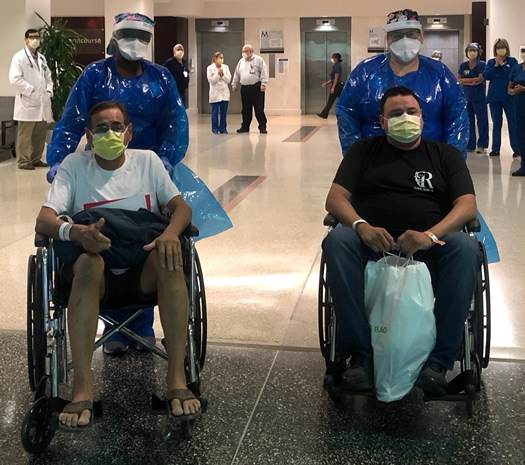DALLAS — Routinely working 70 hours a week didn’t take a second thought for Robert Molina. He loved being a maintenance supervisor.
But the COVID-19 pandemic made him re-evaluate his strenuous work ethic and focus on his health — and that of his family.

Robert Molina Sr., and son Robert depart Texas Health Dallas.
“For it to hit my family like this was unbelievable,” the 37-year-old North Texas resident said as he left Texas Health Presbyterian Hospital Dallas.
Molina and his father battled COVID-19 together, and after completing treatment at Texas Health Dallas, they are grateful to tell their story of survival. “We survived,” the elder Molina said. “That’s all that matters. We get to be back with our friends and loved ones.”
After a long day at work one June evening, Robert drove to his father’s home in Garland.
“I had a cough, but I just assumed it was allergies,” he said. “But then the cough got worse, and I ended up with a high fever, chills and body aches.”
Molina thinks his father, Robert Molina Sr., was exposed to COVID-19 because of him. “My dad was acting like my nurse, coming into the bedroom to check on me and everything. It was far from being a terrible sinus infection. It was much worse.”
On June 11, Robert visited an urgent care clinic. A few days later, he found out he tested positive for COVID-19. All he could think of was his 59-year-old diabetic father.
Robert drove to Texas Health Dallas on June 19, and just two days later, his father joined him as a COVID-19 patient.
The younger Molina was given supplemental oxygen, but he still developed pneumonia. His breathing was deteriorating rapidly, and his care team discussed administering COVID-19 convalescent plasma as a possible treatment.
“I was a little nervous, but I made the decision to do it,” Molina said. “It was a do-or-die situation at that point.”
According to Katia Brown, M.D., an infectious disease specialist on the medical staff at Texas Health Dallas and a member of InfectiousCare, a Texas Health Physicians Group practice*, Molina’s situation was serious.
“He was battling pneumonia, and his respiratory system was jeopardized. To improve his lung capacity, Mr. Molina was encouraged to remain in the prone position as much as possible,” Brown said. “In hopes of avoiding deterioration of his respiratory status, we opted to give him all available COVID-19-specific treatments, including remdesivir and convalescent plasma.”
Convalescent plasma has become a more common treatment option for a novel virus in a patient doing poorly and facing possible death. Texas Health was one of the first systems in Texas to offer the treatment.
According to Brown, Molina was a prime candidate.
Within a 24-hour period, Molina said he felt a noticeable difference. “I actually had energy, and I was improving.”
He said he felt a sense of calmness as well.
“Before I got to the hospital, I hadn’t slept in days,” Molina said. “I had a fever of 102º, I couldn’t stay hydrated and I was fighting just to breathe. That plasma treatment provided me with the best sleep I’ve had in a long time.”
Grateful for surviving COVID-19, Molina is also thankful his father experienced a less painful journey. His father’s symptoms were milder. He only required IV fluids and supplemental oxygen to address his shortness of breath.
“With my dad living with diabetes, it could have been worse,” Molina said. “But because he knew what I was going through, it made him more aware.”
The Molinas left Texas Health Dallas on June 26, but the younger Molina admits to feeling some apprehension.
“I’m excited and scared. This disease is terrifying, and I don’t wish it on anybody.”
Brown said the Molinas will continue the recovery process at home, but neither will require respiratory therapy.
Molina — who admits to being a workaholic — said he has two important items on his agenda, once he fully recovers.
“I’ll be spending quality time with my family, especially my two teenaged boys. And I can’t help it; I’ll be counting down the days until I can get back to work.”
To learn more about the plasma donation process and who can donate, visit Texas Health’s Coronavirus Response page.
*Physicians employed by Texas Health Physician Group practice independently and are not employees or agents of Texas Health Resources hospitals.
Related News
About Texas Health Resources
Texas Health Resources is a faith-based, nonprofit health system that cares for more patients in North Texas than any other provider. With a service area that consists of 16 counties and more than 7 million people, the system is committed to providing quality, coordinated care through its Texas Health Physicians Group and 29 hospital locations under the banners of Texas Health Presbyterian, Texas Health Arlington Memorial, Texas Health Harris Methodist and Texas Health Huguley. Texas Health access points and services, ranging from acute-care hospitals and trauma centers to outpatient facilities and home health and preventive services, provide the full continuum of care for all stages of life. The system has more than 4,100 licensed hospital beds, 6,400 physicians with active staff privileges and more than 26,000 employees. For more information about Texas Health, call 1-877-THR-WELL, or visit www.TexasHealth.org.
